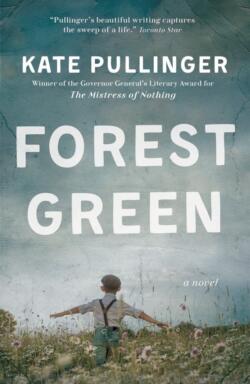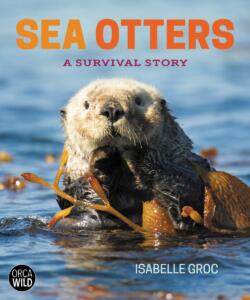Val's Book Reviews

A naval labour of love
Dutchy’s Diaries: Life as a Canadian Naval Officer in His Own Words, 1916-1929
by John Crispo Inglis “Dutchy” Edwards, edited by Helen Edwards
[Victoria]: Helen Edwards, 2020
$29.50 / 9780969728252
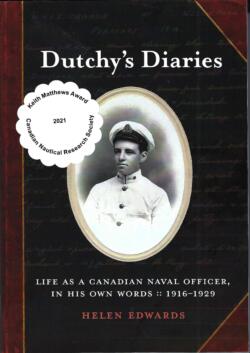
Helen Edwards, a well-known heritage professional researcher in Victoria, has achieved a work of immense importance to naval history in this book..
Her expert research, combined with an obvious love of the subject matter, shines through the pages as she transcribes the journals of Commodore John “Dutchy” Edwards, her late father-in-law.
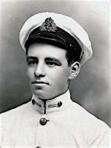
The book’s audience, however, will be limited to those with an interest in world naval history, but that does not deter from the fact that this work is historically very valuable on a wider scale. Aside from her initial introduction and then telling readers about the life of John Crispo Inglis Edwards (nicknamed Dutchy), plus a brief description of The Roaring Twenties leading up to the Depression years, Helen Edwards has left the rest of the story to Dutchy’s own words as she meticulously transcribes his four Journals from 1916-1929.
John Edwards was born in Londonderry, Nova Scotia, in 1896, the sixth child and fourth son of Major Joseph Plimsoll Edwards, a noted Canadian historian. John attended school in Ontario and left at the end of 1911 to become a cadet at the Royal Naval College and graduated as a Midshipman. From there he went on to have an outstanding naval career, retiring after 39 years with the rank of Commodore and dying in Saanich in 1978. While in command of HMCS Cornwallis, he was recognized as Commander of the British Empire (CBE) — an incredible accomplishment for a man who only achieved a Grade 8 education.

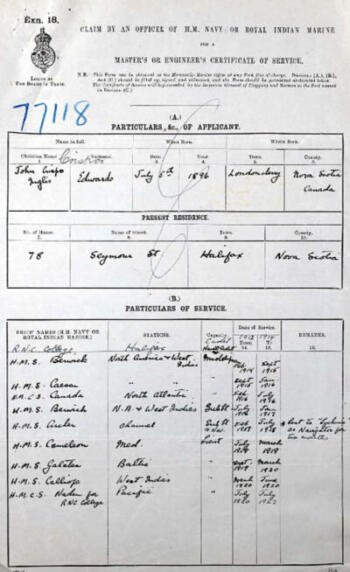
Dutchy’s life comes alive through his own words in the Journals. The first transcribed Journal covers the years from February 1916 to July of 1918 during the Great War when Dutchy served aboard HMCS Canada, HMS Berwick, HMS Vernon and HMS Archer, as he travelled from Eastern Canada to the Caribbean and then to England and the Dardanelles. Not only does this Journal describe his life aboard these ships in wartime, but also the simple pleasures of escaping to a dance when going ashore or having supper with friends and playing bridge, allowing the reader to see a human side to the man.
A Dardanelles Journal entry, dated January 24, 1918, reads:
Jan. 24th Hostile aircraft dropped bomb not far from us at Kastro. Relieved from patrol & proceeded to Mudros. Rec’d. part of our six weeks mail. I was awfully relieved to hear from Mother saying that they were all uninjured at home, after the recent Halifax explosion. Rec’d. numerous letters & Xmas parcels & a whole bag of official correspondence. Heard that the Louvain has been torpedoed quite close to Mudros, with quite a large loss of life. Also most of our Xmas parcels. The “Colne” is pretty sure she got the Fritz who loosed off a mouldy 54 & only missed by three feet. The latter streamed up the track of torpedo & dropped depth charges. It is fine getting some of our mail although I think that a lot of my parcels have gone down.
Journal Two covers the years from July 1918 to November of 1920 in which Edwards continues service in the Dardanelles and as the war draws to a close he transfers to HMS Cameleon and is based in Malta. He then travels to England, visits his older brother’s grave in France, and eventually joins the Royal Naval College at Esquimalt on Vancouver Island as an instructor.

Dutchy’s third Journal covers the years from 1920 to 1926 and tells how, after the College is closed down, he travels across Canada and almost decides to leave the Royal Navy. During these years he also meets his future wife and eventually returns to Halifax as Commanding Officer of HCMS Festubert.
Dutchy’s Fourth Journal spans the years from January 1926 to September, 1929, and describes his further service aboard HMS Valiant, HMS Malaya and HMCS Champlain. During those years, he marries Dorothy Elizabeth Symons and tragically their first child, a daughter, is stillborn. A son is born to them later.
I particularly admire Helen Edwards’ meticulous transcriptions of these four Journals from Commodore Edward’s own handwriting which, she explains, goes from cursive to a more upright rendition. Attempting to transcribe someone else’s writing is a painstaking task which she has undertaken with care.
The book is enhanced with an Edwards family tree, some excellent photographs, a Glossary to assist her readers with naval terms, and some maps. In addition there are Appendices describing all the ships and place names mentioned in the Journals, as well as a complete list of Dutchy’s service from 1912-1950.
This book is obviously a labour of love by Dutchy’s daughter-in-law, Helen Edwards, who has tackled this mammoth task with passion in order to bring his words to life for a world-wide audience. “Imagine my delight,” she writes, “at finding journals written during World War I and beyond — up to 1929 — in a box that we had not looked at before.”
In 2021, Dutchy’s Diaries won the Keith Matthews Award from the Canadian Nautical Research Society. Helen is currently working on a sequel, to be called Dutchy’s Decades, which will follow the rest of his naval service in the decades leading up to his retirement in 1950.
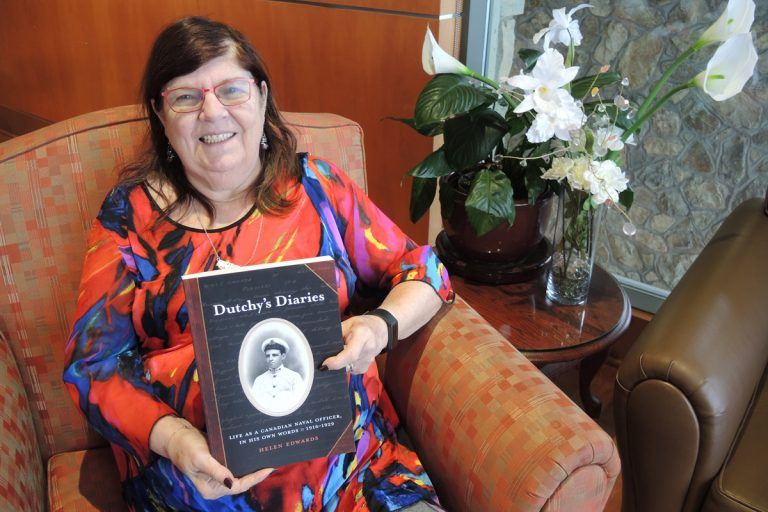
Link to Original Review
“The Ormsby Review, named for pioneering historian and UBC professor Margaret Ormsby, is a remarkable and comprehensive online review of more British Columbia books than you ever imagined existing — the west coast publishing market is lively. It covers fiction, poetry, politics, memoir and much else, as well as a lot of local and west coast history.” – Christopher Moore, September 14, 2020.
Editor and Publisher: Richard Mackie
Mission Statement: The British Columbia Review, formerly The Ormsby Review, is a lively and inclusive Vancouver-based online journal devoted to the literature, arts, culture, and society of British Columbia. Our mandate is to review books by BC-based writers wherever they choose to publish them. We review books from the member publishers of the ABPBC (Association of Book Publishers of BC), but we also review books that are privately printed, self-published, or published by BC writers at publishing houses elsewhere in Canada or abroad. When possible, we also find BC reviewers. Our accessible and authoritative reviews and essays, written by experts in their fields, are packaged as illustrated magazine articles.
The British Columbia Review works with writers, publishers, and literary professionals across Canada to promote books published by BC writers or about British Columbia in all its diversity. We include books by all authors, regardless of race, age, ability, sexual orientation, gender or gender identity, ethnicity, religion, political belief, marital or family status, and/or status as Indigenous, Métis, or Inuit.
The editorial offices of The British Columbia Review are located near Commercial Drive in East Vancouver, in the traditional, unceded, and sometimes overlapping territories of the Musqueam, Squamish, and Tsleil-Wauuth peoples. Indigenous British Columbia, the land on which we live and create, extends over a large area comprising three culture areas, eight language families, and 32 distinct languages. We endeavour to review all books by and about Indigenous BC. Those reviews can be accessed directly here.

